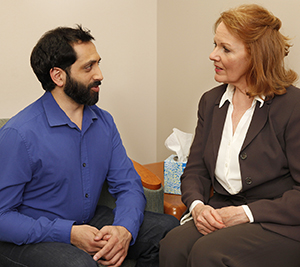A
B
C
D
E
F
G
H
I
J
K
L
M
N
O
P
Q
R
S
T
U
V
W
X
Y
Z
Click a letter to see a list of medical procedures beginning with that letter.
Click 'Back to Intro' to return to the beginning of this section.
Understanding Schizophrenia
Schizophrenia is a severe and puzzling brain disorder. It dramatically changes the way a person thinks, acts, and feels. It can disrupt each life it touches. And it can cause great emotional pain. If you or a loved one has schizophrenia, don’t lose hope. Right now, there is no cure. But treatment may help ease symptoms. There are also many support services for people with this condition and their families. This sheet will help introduce you to schizophrenia.

What are the symptoms?
The symptoms of schizophrenia can vary greatly. People with the disorder may see or hear things that aren’t there. Or they may firmly believe something that isn’t true. At times they may be quiet, listless, and withdrawn. They may have little eye contact, and may not seem to respond. At other times, they might talk or act in strange ways.
Who does it affect?
Schizophrenia affects both men and women. It can strike people of all races, cultures, and incomes. It often begins in early adulthood. It may occur when young people are still in school. They may not have learned certain life skills. And they might not have a chance to build careers or lasting relationships.
What causes it?
The causes of schizophrenia aren’t fully known. It’s likely that many factors are involved. For example, schizophrenia seems to run in families. The disorder may be triggered by traumatic events. Certain brain chemicals also play a role. And brain structure is different in people with schizophrenia.
How to find help
The first signs of schizophrenia can be striking if not shocking. You may find it hard to cope. This is normal. You don’t have to face this problem alone. Learning more about schizophrenia and going to family support groups can help. This can offer you guidance and support. Check with your healthcare provider, local hospital, or mental health clinic about resources in your area.
Schizophrenia often presents lifelong challenges. But new treatments and support from others can offer hope.
Online Medical Reviewer:
L Renee Watson MSN RN
Online Medical Reviewer:
Marianne Fraser MSN RN
Online Medical Reviewer:
Paul Ballas MD
Date Last Reviewed:
1/1/2022
© 2000-2024 The StayWell Company, LLC. All rights reserved. This information is not intended as a substitute for professional medical care. Always follow your healthcare professional's instructions.